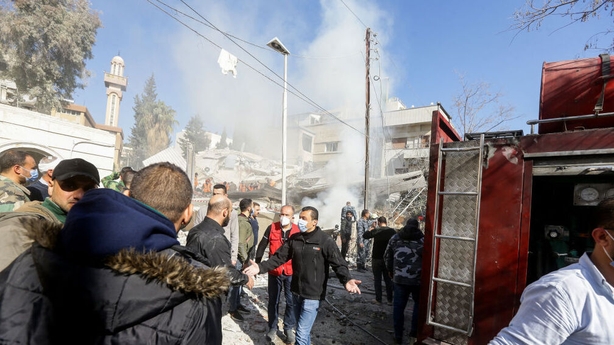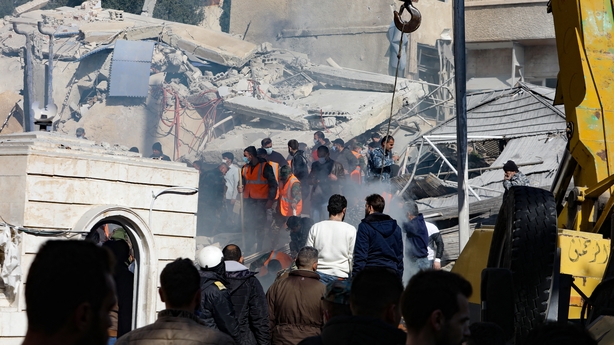Iran has accused Israel of a strike in the Syrian capital Damascus that killed five Revolutionary Guards members, and vowed to avenge the latest attack on the Islamic republic's personnel abroad.
President Ebrahim Raisi said Tehran would not let the "cowardly assassination" go unanswered.
Israel has been accused of intensifying strikes targeting senior Iranian and allied figures in Syria and Lebanon, backers of the Palestinian militant group Hamas, raising fears that fighting in Gaza could spread further.
State media in Iran has reported that the head of the force's information unit in Syria was among the dead.
The Islamic Revolutionary Guard Corps (IRGC) confirmed it lost five members in the strike that it blamed on Israel.
Hamas, which is backed by Tehran, also condemned what it called a "heinous crime".
In a statement, Mr Raisi condemned "this cowardly attack".
"There is no doubt that continuing such terrorist and criminal acts ... will not remain without a response" from Iran, he said.

The Syrian Observatory for Human Rights war monitor said the Israeli strike on the Mazzeh neighbourhood of the capital killed 10 people.
Iranian media reported one of the dead was "General Sadegh Omidzadeh, responsible in Syria for intelligence for the Quds Force", the IRGC foreign operations arm.
There has been no official confirmation of his death.
The Guards' Sepah news agency named four of those killed as Hojatollah Omidvar, Ali Aghazadeh, Hossein Mohammadi and Saeed Karimi.
The mid-morning strike, which sent a large plume of smoke skywards, was also reported by Syrian state media.
Official news agency SANA said a residential building in Mazzeh had been targeted in what it called "an Israeli aggression".
Search for survivors
The defence ministry said the strike killed "a number of civilians".
The building was cordoned off as rescuers searched the rubble for survivors.
"I heard the explosion clearly in the western Mazzeh area, and I saw a large cloud of smoke," one resident told AFP, requesting anonymity over security concerns.
"The sound was similar to a missile explosion."
Asked about the strike, the Israeli military told AFP: "We do not comment on reports from the foreign media."
During more than a decade of civil war in Syria, Israel has launched hundreds of air strikes, primarily targeting Iran-backed forces as well as Syrian army positions.
But such attacks have intensified since the war between Israel and Hamas, which like Lebanon's Hezbollah movement is an ally of Iran, began on 7 October.
The Observatory said the strike hit a four-storey building "where Iran-aligned leaders were meeting".
The Britain-based war monitor with a network of sources inside Syria said the targeted building belonged to the IRGC and that Mazzeh is known to be a high-security zone where leaders of the IRGC and pro-Iran Palestinian factions live.
The neighbourhood also houses the United Nations headquarters, embassies and restaurants.
"They were for sure targeting senior members" of Tehran-backed groups or Iranian forces, Observatory director Rami Abdel Rahman told AFP.

A Reuters witness in Mazzeh saw ambulances and fire trucks gathered around the site of the strike, which had been cordoned off. Rescue operations for people stuck under the rubble were ongoing throughout the late morning.
A spokesman for the Palestinian Islamic Jihad told Reuters that no members of their group were wounded in the strike, following reports that some were at the bombed-out building.
Israel responded to the shock Hamas assault on 7 October by launching a devastating air and ground war in Gaza with the aim of eradicating its ruling Islamist group.
The conflict has reverberated across the Middle East with violence surging in Syria, Lebanon, northern Iraq and in the Red Sea.
In December, an Israeli air strike killed two Guards members, and another near Damascus on 25 December killed a senior adviser to the Guards who was overseeing military coordination between Syria and Iran.
Iran and its military allies in Syria have entrenched themselves in wide areas of eastern, southern and northern Syria and in several suburbs around the capital.
